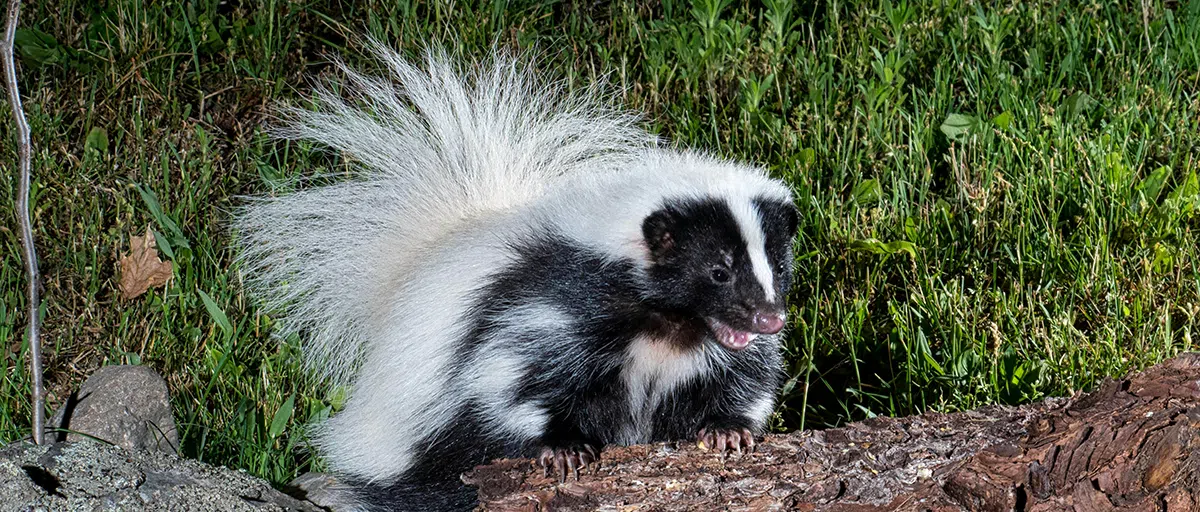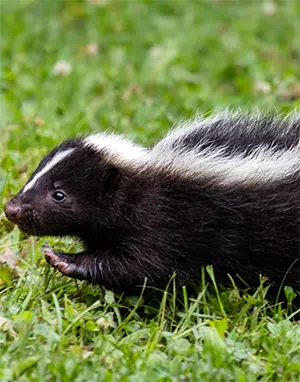It's the middle of February and while we are still trotting through feet of snow and dream of colourful cocktails by the pool, our friend, the skunk is stirring and dreaming of family additions. Come along as we explore the mating habits and breeding season of skunks and what that might mean for you as a home owner in Ontario.

How Long Are Skunks Pregnant?: Skunk Mating Season
Skunks are emerging from winter dens during the months of February and March – on the lookout for a perfect mating partner. Older and more experienced females will generally come into season earlier than first time mums and sometimes unusually warm or cold temperatures may play a role as well. While the ladies are looking for one partner, the males may mate with several (or, as many as available) females in one breeding season. We generally think of skunks as nocturnal animals but, it is actually not that uncommon to see skunks during the daytime. If there is food to be had, if a mid day snooze is interrupted, if one is feeling amorous, and definitely if there are babies… you might see one or more skunks on the road. Hopefully, you'll see them strutting down the road engaged in the pursuit of skunk reproduction and not laying by the side of it; sadly, many skunks end up struck and killed by motor vehicles.
Skunk Courtship Behavior
 So, what does it look like when boy skunk meets girl skunk and passions erupt? What happens before and during date night?
So, what does it look like when boy skunk meets girl skunk and passions erupt? What happens before and during date night?
Scent Marking
Ah yes.. that 'scent'. Curiously, boy skunk and girl skunk use their unmistakable aroma for different purposes. The male will leave his scent behind to entice the ladies in the vicinity (really? That works?). While we may not be able to discern a difference, apparently, not all skunks smell the same. Two or more males may also end up fighting over mating rights and spray their opponents. Females, on the other hand, will signal their utter disapproval by releasing their spray. There's nothing like a puff of smelly air to relay a 'no, thank you' message to an unsuccessful suitor.
Vocalizations
Yep. Skunks actually make sounds. Who knew? Male skunks will let out a series of grunts and growls during courtship. Those are low pitched sounds that can be heard over a fair distance and intended to communicate dominance and suitability to the ladies in the area. During actual mating, the male will produce a high pitched squeal, while the female can be heard 'purring'. Outside of mating rituals skunks also do some lip smacking to convey contentment and mothers may stomp their feet to drive off a threat to her offspring.
Chase Behavior
Male skunks will not chase female skunks during mating season. They will, however, chase and fight each other - for the right to pursue a female. The female has the last word and makes the decision of who gets to father her offspring. Once the deed is done, the male will wonder off in pursuit of another mate.
Skunk Gestation Period
In a rather genius move by Mother Nature, a female skunk can 'save' the male’s sperm by storing it separately from her eggs and delay pregnancy until the weather warms up a bit or she otherwise deems conditions to be acceptable. Once impregnated, Momma Skunk will carry her kits for about 60-70 days before giving birth - a fairly lengthy gestation period. An average skunk litter consists of about 4-7 little ones, but as many as 10 have been recorded. Only one litter is born per year.
Signs of Pregnant Skunks
Enlarged Abdomen
A pregnant female will definitely have a rounder belly and enlarged nipples - although, you probably wouldn't want to be close enough to actually observe that. Especially during pregnancy and after birthing her kits, momma skunk will be more confrontational than usual. Now, more than ever - distance is your friend!
Reduced Agility
Again, it may be difficult to determine how agile or not a pregnant female skunk really is. After all, they aren't exactly the most quick and acrobatic critters at the best of times. But yes, the expectant mother will slow down some and waddle a bit slower than usual.
Changes in Behavior
Expectent mums will be out 'n about more during the day and they will be looking for suitable digs to raise her kits. They often repurpose old dens from other animals or use move-in-ready hiding places like under decks or porches, in crawl spaces, in quiet sheds and other structures, or beneath woodpiles. While skunks are primarily solitary animals, several females can raise their young in a communal den. As mentioned earlier, pregnant skunks will also display increased defensive behavior to protect their delicate condition and forthcoming family additions.
Do Not Trap a Pregnant or Nursing Skunk
You'd rather not live with the lingering perfume of one or more skunks - understandable. But now is NOT the time to trap. You don't know and can't tell how close lady skunk is to the birth of her babies and moving her at this stage could prevent her from finding and preparing a suitable den before her kits' arrival. Trapping and relocating her right now could have dire consequences for her and her litter. Unless you can trap early in the month of February, you'll probably need to resign yourself to hosting a family of skunkers for the summer. By the end of summer, the young will be ready to move out and into the world on their own.
Humane Skunk Management with Hawkeye
Now, that you are more familiar with skunk mating habits and understand their breeding season a bit better, we hope you won't interfere with Madam Skunk at this time. Please understand that if you were to trap a nursing mother, her babies would be sentenced to an agonizing death of starvation. We'll want to avoid this at all cost. However, if you absolutely cannot wait until the skunk kits are grown, call Hawkeye Bird & Animal Control for an assessment and skunk management plan. Contact a licensed Wildlife Specialist who can at least locate the den, assess the age of the kits, and provide options from there.














